 | |
| Author | Henry Sidgwick |
|---|---|
| Language | English |
| Subject | Ethics |
Publication date | 1874 |
| Publication place | United Kingdom |
| Media type | |
The Methods of Ethics is a book on ethics first published in 1874 by the English philosopher Henry Sidgwick.[1] The Stanford Encyclopedia of Philosophy indicates that The Methods of Ethics "in many ways marked the culmination of the classical utilitarian tradition." Noted moral and political philosopher John Rawls, writing in the Forward to the Hackett reprint of the 7th edition,[2] says Methods of Ethics "is the clearest and most accessible formulation of ... 'the classical utilitarian doctrine'". Contemporary utilitarian philosopher Peter Singer has said that the Methods "is simply the best book on ethics ever written."[3]
The main aim of the book is to provide a systematic account of the principles of commonsense morality. The three general methods of making ethical choices commonly used in ordinary morality are intuitionism (following general principles), egoism (promoting one's own well-being) and utilitarianism (promoting everyone's well-being). According to Sidgwick, intuitionism and utilitarianism are in harmony with each other but egoism cannot be reconciled with utilitarianism, resulting in a "dualism of practical reason".
- ^ "Henry Sidgwick, 1838-1900" at The History of Economic Thought Website Retrieved January 5, 2010
- ^ Sidgwick, Henry (1981), Methods of Ethics (7th [Hackett reprint] ed.), Hackett Publishing Co., ISBN 0-915145-28-6
- ^ Peter Singer - Interview at NormativeEthics.com, hosted by archive.org. Retrieved November 8, 2016